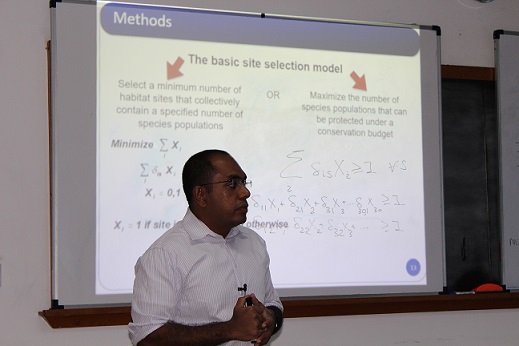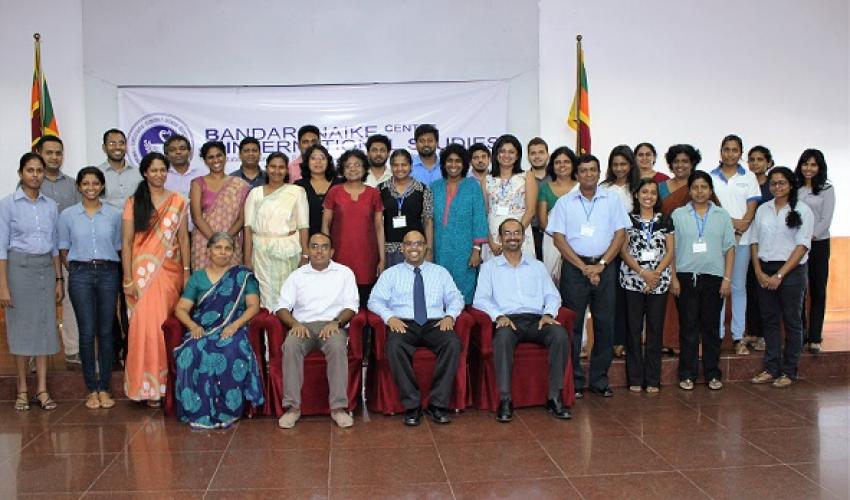Economics to value nature in Sri Lanka
The benefits we get from nature, formally referred to as ecosystem services, are numerous: we consume water from rivers, lakes and ground water sources; use water for industry and hydro power production; enjoy our environment for recreation; and breathe the air the ecosystem provides, among others. However, these very same services face growing threats due to human behavior and lack of appreciation. How do we get the attention of everyone, including country leaders, governments, and communities, including the private sector, to pay attention and invest in preserving the environment and saving environmental services that are fundamental to our very existence?

A session led by Dr. Sahan T. M. Dissanayeke, Assistant Professor of Economics at Colby College, USA
Photo: Bandaranaike Center for International Studies (BCIS)
Part of the reason why we take ecosystem services for granted is that these services are not described in economic or monetary terms. Planners, development partners and investment agencies are more attuned to economic numbers. Therefore, it is necessary to quantify ecosystem services in rupees or dollars.
In 1992 IUCN led the global effort to understand the importance of ecosystem services and biodiversity and helped formulate the Convention on Biological Diversity (CBD) based on the Millennium Ecosystem Assessment (MEA). It also established The Economics of Ecosystem Services and Biodiversity (TEEB) project (http://www.teebweb.org/ ).
At a time when the country is anticipating rapid development in post-conflict era, with many pressures on the natural environment, the time is right for Sri Lanka to embrace the TEEB concepts according to IUCN Sri Lanka. It is ever more important for us to incorporate nature into decision making at both national and regional levels to safeguard and sustainably use the abundant natural resources and healthy ecosystems that produce essential services that are vital to peoples’ wellbeing.
In an effort to promote the inclusion of ecosystem services into decision-making in Sri Lanka, IUCN Sri Lanka joined with the Bandaranaike Center for International Studies (BCIS) to conduct a two-day short course focused on using economics to value, protect, and restore ecosystem services and biodiversity on 22 and 23 August 2016 at BCIS. The course, which targeted participants from government, private sector, NGOs and academia, started with an overview of ecosystem services and biodiversity and then presented the methods used to value ecosystem services and guide and incentivise restoration and protection of ecosystem services at the landscape level.
The course focused on experiment surveys and land use optimisation models as tools to guide policy decisions and ended with a discussion of payment for ecosystem services (PES) programmes, green accounting and how to incorporate ecosystem services into national accounting. The course also included lab exercises to provide hands-on training for the participants.
The course was organized and led by Dr. Sahan T. M. Dissanayeke, an environmental economist working as an Assistant Professor of Economics at Colby College, USA and a Research Consultant at IUCN Sri Lanka. Multiple local experts including Prof. Nimal Gunathilleke, from the University of Peradeniya, Dr. Prasanthi Gunawardena, Department of Forestry and Env. Sc., University of Sri Jayewardenepura, Mr. Leel Randeni, Biodiversity Secretariat, Ministry of Mahaweli Development & Environment, Mr. Shamen Vidanage, Programme Coordinator IUCN Sri Lanka, and Dr. Prakrama Weligamage, Department of Agricultural Economics and Business Management, Univ. of Peradeniya presented case studies and applications from Sri Lanka. The course was attended by 32 participants from government, private sector, NGO and academic institutions.
 Photo: Bandaranaike Center for International Studies (BCIS)
Photo: Bandaranaike Center for International Studies (BCIS)
The programme started with an introduction from Dr. Ananda Mallawatantri, the Country Representative IUCN, Sri Lanka, where he stressed the importance of environmental economics and valuing ecosystem goods and services. Throughout the course, positive and encouraging feedback was received from the participants who actively participated in discussions regarding the current issues in Sri Lanka and how these techniques can be implemented. In addition, participants discussed the challenges in valuing ecosystem services in Sri Lanka and how to overcome those problems. The programme was successfully completed by IUCN and BCIS with an award of certificates to the participants.
